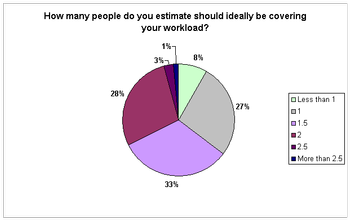Spread Thin Britain – Health Care Workers Increasingly Stretched
Add bookmark- Average British health care employee works the equivalent of a seven and a half day week
- One in three say they are doing the work of at least two full-time people
- 10% unable to take holiday this summer because of work pressure
- 15% of workers admit making mistakes at work because of tiredness or stress
British health care professionals are working harder than they were one year ago according to research carried out by Randstad, the UK sector specialist recruiter.
In a survey of over 2,000 British employees[i], Randstad found that doctors, nurses and other health care professionals feel they are performing the job of 1.5 people meaning they are covering 50% more work than one person should be – the equivalent of two and a half additional work days every week. In contrast, British employees across all sectors feel they are performing the job of 1.3 employees – an additional day and a half.
While just over a quarter (27%) of those in health care feel their workload is suitable for one person, nearly a third (33%) feel that in an ideal world their role would need one full time and one part-time member of staff. 28% believe their role needs two full-time people to manage the level of work and 4% feel their role really needs at least two full-time members of staff as well as an additional part-time person.

Vicky Short, operations director of Randstad Care, said:“It’s clear that public austerity measures are exerting more and more pressure on local authorities and the NHS to keep their workforces as lean as possible. Health care professionals are facing greater workloads and reduced capacity as funding restraints are causing job cuts. While this will help many employers navigate the squeeze on funding, it isn’t sustainable.
“Spreading the workforce too thin leads to burnout, mistakes and lower productivity in the long-run. It’s vital that heavier work burdens for health care professionals do not lead to the erosion of the quality of service provision.”
Workload taking its toll
The rise in workload is taking its toll on Britain’s health care workforce. One in four workers (25%) feel more stressed now than they did six months ago, nearly half (49%) said it takes longer to switch off at the weekends than it did six months ago and one in ten (11%) are consistently sleeping badly because of work.
Holidays unable to ease pressure
Rising stress and work worries also mean that holidays are unable to provide suitable respite. 10% of health care respondents feel unable to take holiday this summer because of work pressure. And while one third (34%) of employees have been able to take two or more weeks off work for their main holiday this year, one in nine employees (11%) will be checking emails or calls, with a further 13% worrying about what is happening at work in their absence.
One quarter (25%) of workers said their colleagues are expected to cover their role on top of their own work while they’re on holiday with 36% saying their colleagues were expected to do enough to ‘keep things going’. Only one in ten (10%) said their work is covered for them by a temporary member of staff.
Vicky Short adds:“Being able to take a break and switch off from work is vital for productivity, but this year the holiday season has stretched the health care sector to the limit. Balancing staff costs and the risks of a burnt out workforce and maintaining quality standards is difficult at the best of times but during August the scales have tipped. Using skilled temporary staff to cover holidays and leaner teams can be a flexible solution to ease the burden for all sides, maintaining the quality of service, and could keep permanent workforces more motivated, healthy and productive – a long-term benefit which far outweighs the short-term cost.”
[i]Research of 2001 consumers conducted by Canadean Research between 23rd and 30th July 2012 – further details available on request




















